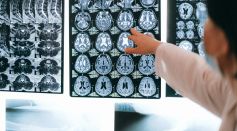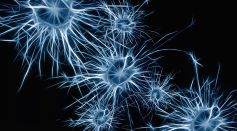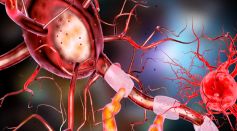Tags: Brain

Brain Retrieves Irrelevant Information In Older Adults Due To Abundance Of Memories Resulting To Poorer Memory Performance

How Does SARS-CoV-2 Attack the Body? Long COVID Also Affects the Brain, Heart, Other Vital Organs

Learning and Memory: New Study Shows the Role of FMRP Protein in How to Memorize Things, Events, and Activities

Ebola Virus Hiding in Brain? New Study Reveals It May Stay There Even Years After Treatment

Man Discovers Black Mold Growing in His Brain Causing Severe Headaches, Facial Paralysis, and Other Symptoms

Cerebral Cortex Found Responsible for Speech to Ensure People Say The Right Words

How Does Heartbreak Affect the Body? Here's the Science Behind A Broken Heart

Are We Living In the Past? New Study Shows Brain Acts Like A Time Machine That Brings Us 15 Seconds Back

Physical Exercise Can Help Adults Fight Dementia-Related Conditions, Study Says

Men vs. Women Brains: Study Finds 1,000 Genes Are More Active in One Gender Than the Other

Heightened Brain Activity While Asleep to Perceive Unfamiliar Voices Could Be An Evolutionary Trick Against Potential Threats

People Who Have Developing Dementia Struggle to Identify Truth, Lies, and Sarcasm [STUDY]

How Are Memories Stored? Tailor-Made Microscope Shows How Brain Cells Create New Synapses in Groundbreaking Study

Why Forgetting Is Not Really a Bad Thing? Here's What Neuroscientists Say

Olfactory Receptor Gene Involved in the Sense of Smell Helps Breast Cancer Spread to the Brain, Bones and Lung Study Reveals

How Neurons Work? Neuroscience Model of Hebbian Theory Shows Neuronal Circuits Working Like Wires

Obsessive-Compulsive Disorder: New Study Shows Potential Emergency Treatment Through Brain Stimulation

Ancient Big-Headed Fish May Be the Key to Evolution, Brain Scans Show They Left Water to Invade Land

Glowing Neurons: Genetically Modified Jellyfish Gives Light on How Human Minds Work

People Who Claim Seeing Unidentified Aerial Phenomenon Have Something Unique In Their Brains, Analyses Show Signs
Most Popular

Will Earth's Magnetic Poles Flip Next? Magnetic Pole Reversal Explained Through Cutting‑Edge Magnetosphere Science

How Lightning Science Reveals Why Charged Storms Are Rising with Global Warming Effects

Relativity Time Dilation Explained: The Physics of Time and Why It Moves Differently in Space

De-Extinction vs. Conservation Science: Which Approach Protects Biodiversity Most Effectively?





